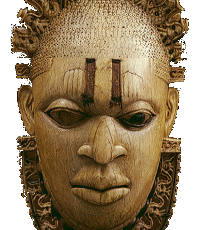An African international system?
The question is whether it is possible to talk about a distinct African international system and, if so, what its characteristics might be. There are good reasons to conclude that there is no such system. After all, in many parts of Africa geography and the climate have put up obstacles to the formation of the kinds of political structures which we think of as states. In the rainforest, the vegetation was usually too dense to clear and no large communities could be formed, and further inland people were often pastoralists and not that easy to organize politically. And if there are no states, there can be no inter-state system. Yet one’s ecological niche is not one’s fate, and Africa has been full of mighty empires, elaborate political structures, and unimaginably wealthy kings. Even the most remote locations have been connected to international trading networks.
Two separate waves of expansions have served to unite the African continent — the Arab invasion and the Bantu migration. The Arab invasion connected North Africa to the caliphates in the Middle East and thereby to prosperous centers of civilization. Moreover, Islam united people behind one God and one set of religious practices. Likewise, the Bantu migration spread kindred languages throughout the continent together with cultural practices and technical know-how. Yet it was trade which more than anything brought the continent together. The trade in gold, salt and slaves was particularly brisk and it was the profits derived from these key commodities that convinced Berber merchants to cross the Sahara and that took Arab dhows down the Swahili coast. This is also what eventually brought European explorers and merchants to Africa. It was by taxing this trade that city-states grew rich and expanded into kingdoms and empires. It was also trade which more than anything allowed people to escape their ecological niches. Trade made cities spring up in the desert and gave the people of the jungles the resources they needed to cut down even the tallest of trees.
But relations were not always peaceful. The bands of people living in the rainforest often conducted raids on each other, and the states on the savanna relied on powerful armies that could subjugate and enslave their enemies. Yet wars in Africa were different from many wars fought elsewhere. Since land was an abundant resource, it was not worth fighting over; and while a salt or a gold mine would constitute a precious catch, there was little point in territorial expansion as such. The only proper exceptions to this rule are the Yoruba city-states in the Niger Delta which were very concerned indeed about territorial boundaries. For the most part, however, political leaders were content to raze the capital of the enemies they had defeated, humiliate them and include them as a subordinate partner in an alliance. That is, diplomacy would soon come to replace overt acts of warfare. By means of diplomacy, the subordinate state would become a tribute bearer who brought gifts to the suzerain state. This is how the empires of Africa were created.
Often these political relations were expressed in the language of kinship. The powerful state was the “father,” while the subordinate states were “children” or other, more distant, relatives. By tracing their genealogy back to a common ancestor, the unity of the alliance was strengthened. This was also how the empires expanded. If a group of people established a community at a new location, they would link their ancestry back to the original state. Thus, even while the original state was broken up, the result was an expanding alliance of related states. Alternatively, states which shared no political genealogy might make one up in order to cement their common bonds. Similar ties helped protect the trading routes. In Central Africa, long-distance traders often declared each other “brothers” and insisted on the right of safe passage and on political protection. States that traded with each other could be declared friends and relatives too and thereby exempt from acts of warfare.
But this does not amount to one, all-encompassing African international system. The continent is too vast and relations between its assorted regions not nearly strong enough to be described as integrated. Although trade connected west and east with north and south, no political relations were equally extensive. Besides, the trade routes did not only link various African locations with each other but Africa with the rest of the world. Northern Africa had close links to the Middle East and Europe; Eastern and Southern Africa traded across the Indian Ocean; and West Africa, from the sixteenth century onward, was a partner in the trade across the Atlantic Ocean.



